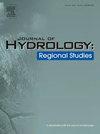基于降雨时间变化的城市水资源配置优化
IF 5
2区 地球科学
Q1 WATER RESOURCES
引用次数: 0
摘要
研究区域:中国北京市。研究重点降水的时间变异性导致了水资源的时空波动和需求的不确定性,使得传统的年度水资源分配策略存在不足。针对这一问题,本研究提出了一种基于降雨时间变化的城市水资源优化配置方法。该框架包括三个关键部分:(i)利用长短期记忆(LSTM)神经网络分析降雨时间分布特征;(ii)在历史平均水平的基础上,将年用水需求时间分解为月尺度,并通过自适应优先调整协调多源供应;(iii)利用改进的非支配排序遗传算法(INSGA-II)建立了一个多目标数学模型。研究结果表明,在四个优化方案中,水资源分配优先级每月进行战略性调整,导致各种水源的年贡献发生变化。例如,在高降水期间,地下水取水量减少,而地表水和非常规水的贡献相应增加。与基准年相比,优化方案提高了经济效益,用水量分别减少0.35 × 108 m3、0.55 × 108 m3、0.70 × 108 m3和0.68 × 108 m3。本文章由计算机程序翻译,如有差异,请以英文原文为准。
Rainfall temporal variability-oriented optimization of urban water resources allocation
Study region
Beijing City, China.
Study focus
The temporal variability of precipitation induces significant spatiotemporal fluctuations and uncertainties in water availability and demand, rendering conventional annual water allocation strategies inadequate. To address this issue, this study developed a rainfall temporal variability-oriented optimization method for allocating urban water resources. The framework comprised three key components: (i) analysis of rainfall temporal distribution characteristics using long short-term memory (LSTM) neural network; (ii) temporal disaggregation of annual water demand into monthly scales based on historical averages, with coordinated multi-source supply through adaptive priority adjustment; (iii) development of a multi-objective mathematical model solved using the Improved Non-dominated Sorting Genetic Algorithm (INSGA-II).
New hydrological insights for the region
The results demonstrated strategic monthly adjustments in water allocation priorities across the four optimized schemes, leading to shifts in the annual contributions from various water sources. For example, during high precipitation periods, groundwater withdrawals declined, while contributions from surface water and non-conventional water increased accordingly. Compared to the baseline year, optimized schemes improved economic efficiency, with water consumption reductions of 0.35 × 108 m3, 0.55 × 108 m3, 0.70 × 108 m3, and 0.68 × 108 m3, respectively.
求助全文
通过发布文献求助,成功后即可免费获取论文全文。
去求助
来源期刊

Journal of Hydrology-Regional Studies
Earth and Planetary Sciences-Earth and Planetary Sciences (miscellaneous)
CiteScore
6.70
自引率
8.50%
发文量
284
审稿时长
60 days
期刊介绍:
Journal of Hydrology: Regional Studies publishes original research papers enhancing the science of hydrology and aiming at region-specific problems, past and future conditions, analysis, review and solutions. The journal particularly welcomes research papers that deliver new insights into region-specific hydrological processes and responses to changing conditions, as well as contributions that incorporate interdisciplinarity and translational science.
 求助内容:
求助内容: 应助结果提醒方式:
应助结果提醒方式:


